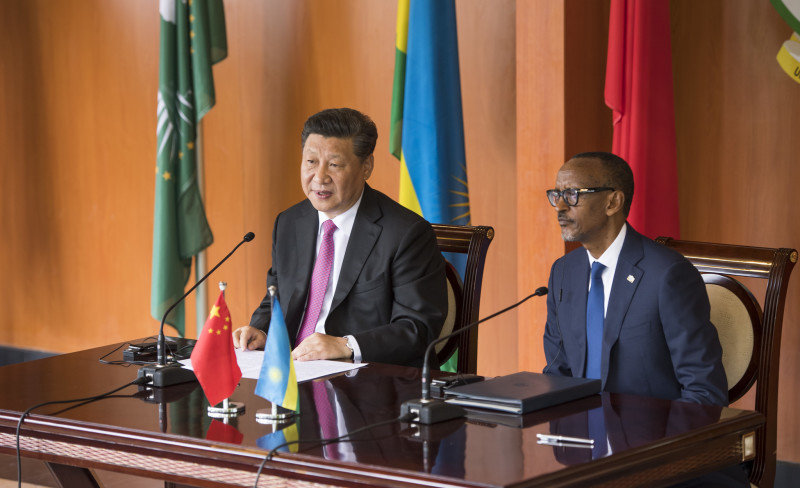
Many accusations have been directed towards China including recent allegation of the Chinese authorities pressuring WHO to delay declaring COVID-19 as a pandemic, which has cost millions of lives worldwide. The Heritage Foundation recently reported that Chinese Government Buildings in Africa Are a Likely Vector for Chinese Spying.
Joshua Meservey, the Senior Policy Analyst for Africa and the Middle East at the Heritage Foundation published that "Beijing likely has better surveillance access to Africa than anywhere else by having built or renovated at least 186 African government buildings," and that the government "likely uses surveillance to, among other things, advantage its companies competing for contracts, spy on U.S. officials, and influence African officials."
He added that The U.S. should, among other efforts, work to understand the nature of Chinese surveillance and how it contributes to Beijing's influence operations, educate U.S. companies on the risks, and train its officials on techniques to complicate Beijing's information gathering in Africa.
Meservey told Fox News: "The building spree is just one element of an extraordinary effort by Beijing to curry favor with African governments, and all evidence suggests it has been hugely successful."
"Beijing is challenging the U.S.-led global order that has brought unprecedented prosperity and stability to the world, including to the U.S. It wants to upend that system in favor of one so structured that no one dare oppose Beijing's plans."
The report stresses that China's two-decade-long blitz of engagement in Africa has likely provided it extensive surveillance access to the continent. Chinese companies, all of which are legally obliged to help the CCP gather intelligence, have built at least 186 government buildings in Africa and at least 14 sensitive intra-governmental telecommunication networks. Beijing also donated computers to at least 35 African governments.
"The wealth of information the CCP probably gathers in Africa presents four primary dangers for the U.S., as that information could be used to facilitate Beijing's influence operations on the continent; recruit intelligence assets at senior levels of African governments; and gain insight into U.S. diplomatic strategies, military counterterrorism operations, or joint military exercises."
Meservey mentioned that Beijing's eavesdropping on African government buildings likely extends well beyond the AU headquarters. He emphasizes that at least 40 of Africa's 54 countries have a government building constructed by a Chinese company.
"Given the difficulty of gathering comprehensive data on independent China's nearly seven decades of engagement with Africa, these numbers are almost certainly an undercount," he stated.
In the interview with Fox News, Meservey further noted that, "in the African context, many African governments know that embedded within Chinese engagement-its loans, aid, and cultural exchanges-is spying, espionage, and influence operations."
"My sense is that African rulers do not believe there is anything so valuable that it is worth risking the relationship with China. Some African rulers also personally benefit from engaging with China-swanky government buildings are just one example-which influences them towards being less wary of Chinese espionage than they might otherwise be"
Most of the Chinese companies that built these structures are probably state-owned enterprises (SOEs) and they have an obligation to obey orders from Chinese authority. Chinese law also compels private companies to assist the Chinese government in collecting intelligence, "in addition to Huawei's role in the AU bugging-of ostensibly private Chinese companies engaging in surveillance and espionage on behalf of the Chinese government.'
"Chinese government documents reveal that data collected from smart city technology is sent back to China for analysis that helps the CCP in its public diplomacy efforts. A pattern has also emerged of widespread backdoors in Chinese technology companies products that they are slow or refuse to fix," the report states. The report refers to a 2019 analysis from a cybersecurity firm which revealed that "more than half the Huawei devices it tested had at least one possible backdoor that could allow unauthorized users access to the devices-a far higher rate of vulnerability than devices from other companies."
The report also points out the impact these activities have on the United States, noting that Washington "should try to complicate Beijing's surveillance of an important continent as part of a strategic response to the CCP's effort to reshape the global order," given that the espionage activities of Beijing costs Americans more than $50 billion per year according to a recent US Trade Representative investigation.
"If Beijing's surveillance blankets the most sensitive offices of some African governments, the CCP can gain insights into leaders'' personalities, habits, and preferences that would help Beijing tailor its influence campaigns directed at senior leaders," Meservey noted. "Building such influence is important to achieving the CCP's goal of becoming an unassailable global power. If it succeeds, the U.S.'s own global power would diminish, given the incompatibility of the American and Chinese political systems."
The effort is seemingly paying dividends in Africa, as "the governments there are usually reliable Chinese allies in international forums." Moreover, Beijing's spying "could pick up sensitive conversations between senior American officials and their African counterparts. That would include U.S. military officers who frequently meet with senior African officials to discuss joint military exercises, counterterrorism operations, and other activities it would be best not to divulge to a competitor like China."
"Beijing understands that economic might is the core element of overall national strength. With its ongoing economic espionage against the U.S., Beijing simultaneously strengthens itself and hurts the U.S., a double win for it."
"The fact that Beijing likely has virtually unimpeded surveillance access to many African governments heightens the danger for American companies, especially tech companies, that are increasingly interested in Africa and engaging with African governments."


















